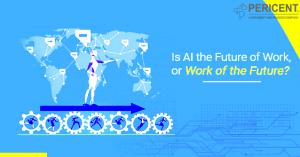Is AI the Future of Work, or Work of the Future?
Artificial Intelligence is Going to be a Major Game Changer for Industrial Revolution, Which way will it sail?

There is no doubt that our generation witnessed the roots of the upcoming industrial revolution due to the implementation of AI. Robots are going to be the main reason for flipping the face of an upcoming industrial environment. Are you ready to hand over your crucial tasks to a robot?
AI trends are enhancing the future of work by automating repetitive tasks, improving decision-making processes, and increasing efficiency. With the help of AI, businesses can make data-driven decisions, personalize customer experiences, and reduce costs. AI also enables remote work and collaboration, making it easier for teams to work together regardless of location.
However, it might sound exciting but safety and economic transformation are crucial concerns to think of. How to save humans from robotized systems in case something goes wrong? We have reduced salaries because of some tasks being done by robots? Will human workforce requirements drastically slope towards the south? To give an answer to these questions, it is unavoidable to regulate the process of AI development and the integration of humans and computers.
90% of Jobs Now Require IT Skills
Millions of people still with insufficient Basic IT skills
Digitization created Millions of New Jobs
Human work is being evaded by the robots
Now how all these will be lined up in a productive way?
Will AI Ever be Better Than Us?
Artificial Intelligence (AI) has a long way to go before competing with humans. Undoubtedly, robots are much better than humans in computing and doing repetitive tasks. Basically, there are two types of AI: Weak and Strong. The neural networks that serve as a base of modern AI devices look like having the same working principles as a natural human brain, but actually, they haven’t. Neither robotic programs can analyze and make particular decisions as effective as humans nor even surpass them. Thus, comparing AI and human intelligence is reasonable.
However, robots might beat humans doing various planned tasks but it can turn scarier to trust a machine in decision-making prospects. Resultant, it is good to support AI to lessen the workload of humans but an evasion of human interference is not a cool idea.
Apart from that, we have to think about how society will accept robots who would deal with lots of day-to-day issues instead of humans. This is a future challenge for science communicators and journalists, as they will have to explain to people how to live in this new world.

